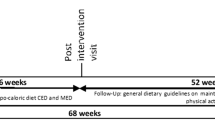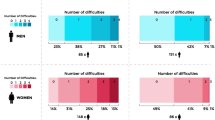Abstract
OBJECTIVE: The goal of the present study was to identify covariates and predictors of post-treatment weight reduction. To clarify the impact of the individual factors, we compared ‘winners’ (losing more than 2 BMI-points in the follow-up period) with ‘losers’ (gaining more than 2 BMI-points in the same time).
DESIGN: In a questionnaire based study, we evaluated the psychological impact on eating behavior, general psychopathology and depressive symptoms at three points in time: three months prior to admission (T0), at the beginning (T1) and at the end of in-patient treatment (T2) as well as 6, 12, and 18 months after treatment (T3–T5).
SUBJECTS: One hundred and thirty eight obese patients (BMI<30 kg/m2) were recruited to the study. All patients participated in a multimodal in-patient treatment program over a period of 10 weeks. Treatment elements were cognitive behavioral therapy, movement therapy, and nutritional counseling. The aim of treatment was to regulate food intake, to minimize dysfunctional emotional influences on eating behavior, to enhance physical exercise and to treat comorbid psychiatric disorders. Twenty nine patients (13%) of the initial sample dropped out or were excluded during the treatment and post-treatment period.
RESULTS: During in-patient treatment eating behavior improved and body weight decreased considerably in all patients. The weight reduction continued slightly in the follow-up period. Moreover, general psychopathology, depressive symptoms and eating behavior improved and remained stable during follow-up. These benefits were closely related to weight reduction. Neither eating behavior, nor eating related cognition nor psychopathology measured at T0 and T1 predicted long term success at T5. ‘Winners’ as compared to ‘losers’ at follow-up showed less psychopathology, less depressive symptoms and a less disturbed eating behavior. Already at discharge (T2), winners were less prone to eating triggered by external stimuli and reported fewer feelings of hunger. These differences predicted post-treatment weight reduction (T3–T5).
CONCLUSION: Reported feelings of hunger and the tendency to disinhibited eating behavior measured at discharge were able to predict post-treatment weight reduction in our sample. Patients suffering from a feeling of hunger during in-patient treatment were less likely to show further weight reduction in the follow-up period. Similarly, reduction of ‘disinhibition’ during treatment is a precondition for post-treatment weight loss.
This is a preview of subscription content, access via your institution
Access options
Subscribe to this journal
Receive 12 print issues and online access
$259.00 per year
only $21.58 per issue
Buy this article
- Purchase on Springer Link
- Instant access to full article PDF
Prices may be subject to local taxes which are calculated during checkout
Similar content being viewed by others
Author information
Authors and Affiliations
Corresponding author
Rights and permissions
About this article
Cite this article
Cuntz, U., Leibbrand, R., Ehrig, C. et al. Predictors of post-treatment weight reduction after in-patient behavioral therapy. Int J Obes 25 (Suppl 1), S99–S101 (2001). https://doi.org/10.1038/sj.ijo.0801710
Issue Date:
DOI: https://doi.org/10.1038/sj.ijo.0801710
Keywords
This article is cited by
-
Can We Benefit from the Preoperative Psychometric Test with Symptom Checklist-90-Revised (SCL-90-R) to Predict Weight Loss After Sleeve Gastrectomy?
Obesity Surgery (2022)
-
Determinants favoring weight regain after weight-loss therapy among postmenopausal women
Scientific Reports (2020)
-
Predictors of successful long-term weight loss maintenance: a two-year follow-up
BioPsychoSocial Medicine (2017)
-
Dysfunctional body investment versus body dissatisfaction: Relations with well-being and controlled motivations for obesity treatment
Motivation and Emotion (2011)
-
Motivational readiness for treatment in weight control programs: The TREatment MOtivation and REadiness (TRE-MORE) test
Journal of Endocrinological Investigation (2011)



